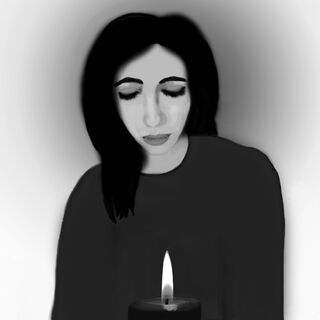Grief
Handling Grief
Acceptance can help one cope with grief and benefits can be gained from it.
Posted September 20, 2020 Reviewed by Ekua Hagan

As a therapist, grief is a topic that arises regularly. I am surprised in my 10 years of writing for Psychology Today I haven’t breached the topic. With the pandemic, it has become even more topical. In fact, a recent issue of Psychology Today devoted the cover to it (August 2020).
Many in the pandemic are dealing with grief in ways that are unprecedented. People have lost loved ones without being able to go through the rituals that are so helpful to grieving (Santos, 2019), others have lost businesses, jobs, and a host of other things.
The nature of grief
Most are familiar with Kübler-Ross’ stages of grief: Denial, Anger, Bargaining, Depression, and Acceptance. Although there are many critics of the stages and little, if any, empirical support (Stroebe, Schut, Boerner, 2017), their popularity over decades indicates that many relate to the stages. Kübler-Ross states herself that “…there is not a typical response to loss, as there is no typical loss. Our grief is as individual as our lives.” (Kübler-Ross, Kessler, 2005, P.7).
Despite grief being individual, it is also universal. In an undergraduate class I teach, we cover grief. Though many of the young students have not experienced grief, I assure them at some time they will. No one goes through life without grief. Relationships end; loved ones perish. Grief, as with many emotions, is universal to the human experience.
When one is in the throes of grief, it may seem unbearable. In all likelihood, it feels like it will last forever. Many grieving feel like life will never be the same. Though this is true, the remark is made as if life will never be good again, and that is not true. Though someone grieving needn’t hear it at the moment (remember to avoid toxic positivity), for most, life will return to a sense of normal. George Bonanno’s research indicates that “most people are able to bounce back and move on with their lives” (Weir, 2020). This doesn’t mean life will be the same, but the level of happiness they experienced prior to any loss will return.
Acceptance
Much of my writing focuses on acceptance. When it comes to grief, my approach is no different. For many grieving, they experience feelings they believe are incompatible with their grief, like moments of joy and humor. Bonanno says, “People should expect to fluctuate between moments of sadness and mourning, and moments of acceptance or even happiness” (Weir, 2020). He continues, “People who cope well with loss usually move in and out of those states. It’s OK to allow yourself to be distracted and entertained, and even to laugh” (Weir, 2020). I include this because many feel guilty about this experience and wonder how they can experience any positive emotion in such a dark time. However, it is normal and not indicative of whatever negatives the individual associates with it. Understanding whatever one is experiencing is within normal parameters can help facilitate acceptance.
Acceptance can also create a sense of space, albeit small, from the emotions, which can help reduce their overwhelming nature. I have discussed this in a good amount of my writing before, but one helpful acronym is RAIN: Recognize what you are experiencing (I am hurting so badly, I am grieving); Accept the experience (my pain is normal, as it demonstrates my love/attachment for what is lost); Investigate the experience (How is this feeling manifesting?); Non-identify with it (create a psychological distance from the experience, realize it is one part of your life, realize like all things, it will pass).
Posttraumatic growth
Much of what I have read lately discusses the positives of adjusting to loss. In a book I loved, Jonathan Haidt uses the term “posttraumatic growth” to describe how people facing adversity as varied as “…cancer, heart disease, HIV, rape, assault, paralysis, infertility, house fires, plane crashes, and earthquakes” and also coping “with the loss of their strongest attachments: children, spouse or partners, and parents” benefit from them. Haidt identifies three ways people benefit: revealing hidden abilities, improved relationships, and a change in priorities and philosophy.
Grief is one of the most painful negative emotions that everyone will experience. It hurts badly. It is normal to have thoughts that life will never be the same or that one will never be happy again. It is also normal to experience an array of emotions during grief, both negative and positive.
Acceptance is one way to get through the experience in a healthy manner. There are also positives that can come from the experience, termed posttraumatic growth. In the end, one must just go through the experience. Accepting you must go through it may help the process along.
Copyright William Berry, 2020
References
Haidt, J. 2006. The Happiness Hypothesis: Finding Modern Truth in Ancient Wisdom. Basic Books. N.Y., New York.
Kübler-Ross E., Kessler D. 2005. On grief and grieving: Finding the meaning of grief through the five stages of loss, Scribner, New York, NY.
Santos, L., 2019, The Power of Made Up Ritual, From the Podcast The Happiness Lab, Season 2, Episode 3. https://www.happinesslab.fm/season-2-episodes/episode-3-the-power-of-a-…
Stroebe, M., Schut, H., Boerner, K., 2017. Cautioning Health-Care Professionals:
Bereaved Persons Are Misguided Through the Stages of Grief. Omega, (Westport), 2017 Mar; 74(4): 455–473. Published online 2017 Feb 13.
Weir, K. 2020. Grieving Life and Loss: The pandemic has led to a series of losses, from financial security to the lives of loved ones. How can we heal? Monitor on Psychology, Vol. 51, No. 4. https://www.apa.org/monitor/2020/06/covid-grieving-life


